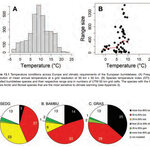
Researchers have discovered that a network of viruses usually associated with managed honeybees pose a widespread risk to bumblebees in the wild also.
The study revealed multiple interconnected diseases that are threatening several species of bumblebee and the managed honeybee, which are essential pollinators of many agricultural crops and wild flowers. Previously research had only identified one virus, deformed wing virus, which had most likely spilled over from managed honeybees into wild bumblebee populations, and fluctuations in wild bees were attributed to pesticides by activist…



